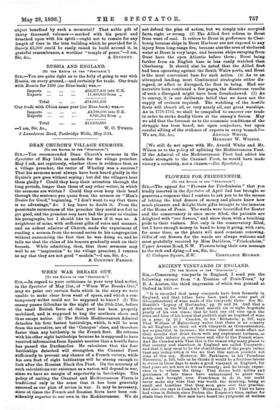WHEN WAR BREAKS OUT.
[TO THR EDITOR OF THR " SPECTATOR."' SIR,—In regard to your criticisms in your very kind notice, in the Spectator of May 21st, of "When War Breaks Out," may we point out certain facts which in the story we were unable to make clear from want of space, and which a con- temporary writer could not be supposed to know ? (1) The enemy passes Gibraltar in the night of the 20th-21st, before the small British force at that port has been properly mobilised, and is supposed to bug the southern shore and thus escape notice. (2) The British Mediterranean Admiral detaches his four fastest battleships, which, it will be seen from the narrative, are of the ' Canopus ' class, and therefore faster than any battleship in the French fleet. He returns with his other eight battleships because he is supposed to have received information from Spanish sources that a hostile force has passed the Dardanelles. He calculates that the four battleships detached will strengthen the Channel Fleet sufficiently to prevent any chance of a French victory, while his own fleet of eight battleships will be strong enough to Look after the Russian Black Sea Fleet. On the accuracy of such calculations our existence as a nation will depend in war, ohne we have no margin of superiority in battleships. The policy of uniting the Channel and Mediterranean Fleets is traditional only in the sense that it has been generally assumed as oar plan of action in war. It may be necessary, since at times the French and Russian fleets have been con- siderably superior to oar own in the Mediterranean. We do not defend the plan of action, but we simply take accepted facts, right or wrong. (3) The Allied fleet retires to Brest from want of coal. It retires to Brest in preference to Cher- bourg because ships in Brest Harbour are not exposed to any injury from long-range fire, because also the area of sheltered water at Brest is very large, and because ships escaping from Brest have the open Atlantic before them ; Brest being farther from an English base is less easily watched than Cherbourg. It should also be noted that the Allied fleet had been operating against the South Wales ports, and Brest is the most convenient base for such action. (4) As to an attempted landing, most Continental strategists either dis- regard, or affect to disregard, the fleet in being. Had our narrative been continued a few pages, the disastrous results of such a disregard might have been foreshadowed. (5) As to convoy, it is our deliberate belief that we have not the supply of cruisers required. The watching of the hostile fleets will absorb all, or very nearly all, our great warships. As in 1778-1783, we shall be compelled to uncover our trade in order to strike deadly blows at the enemy's forces. May we add that the forecast as to the economic conditions of the struggle has been based, not upon conjecture, but upon careful sifting of the evidence of experts in every branch ?—
HERBERT W. WILSON.
[We still do not agree with Mr. Arnold White and Mr. Wilson as to the policy of splitting the Mediterranean Fleet. If the Admiral of the Mediterranean Fleet had added his whole strength to the Channel Fleet, he would have made victory a certainty, not a chance.—ED. Spectator.]


































 Previous page
Previous page